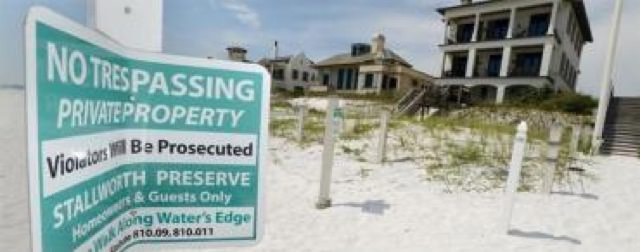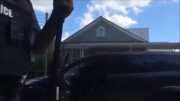Walton County’s new blanket ban on signs on private beach property violates a retired couple’s First Amendment free-speech rights, Pacific Legal Foundation attorney Christina Martin told me Friday. And PLF has filed a lawsuit in the in federal court on the couple’s behalf.
Edward and DeLanie Goodwin, who have owned their beachfront home in the Panhandle community Santa Rosa Beach, since 1978, say their ability to protect their privacy, personal safety and property rights is at much at stake as their loss of First Amendment rights.
Martin met up with me at lunchtime at the James Madison Institute’s Policy Summit in Orlando, after she had served on a panel on the environment and private property rights.
She quoted Ronald Reagan to make her point: “Reagan once said, ‘Freedom is indivisible. There is no ‘s’ on the end of it. You can erode freedom, diminish it, but you cannot divide it and choose to keep ‘some freedoms’ while giving up others.'”
It’s as if our 40th president was responding directly to Goodwins’ situation, Martin said. The new county law stops beachfront property owners from maintaining signs on their own property. The county passed the law in June, it became effective July 15 and PLF had its lawsuit filed July 18.
The case highlights the fundamental connection between property rights and other core rights, such as freedom of speech. “You can’t erode one, as Reagan would say, without undermining others,” Martin said.
Christina Martin
The Goodwins built their beachfront home 38 years ago. Today, they live there much of the year, enjoying the coast with their daughter, grandchildren, and extended family. Like many beachfront owners across Florida, the Goodwins own the sandy beach in their backyard down to the mean high water line. The public owns the wet beach from that line down to the Gulf waters.
But with its sign ban, Walton County is trying to erase the boundary between public and private property, Martin said.
Spring break and the summer draw large crowds to Walton County beaches. Certainly most beachgoers are respectful. But there are times when loud parties, alcohol abuse, and littering result in serious encroachment. Despite clearly marking their property’s boundaries and posting “No Trespassing” and “Private Property” signs, Martin said, the Goodwins have still encountered strangers intruding on their land. “At times, individuals have set up tents, allowed their pets to defecate, and left refuse on the Goodwins’ property.”
About once a year, she explained, strangers have crossed the Goodwins’ dry beach without permission and entered their home. Understandably, like landowners anywhere else, they want to protect their family and control who is allowed on their land.
“All we want is to protect the traditional American right to engage in free speech on our own private property,” Edward Goodwin said in a written statement. “For decades, we have enjoyed and nurtured the sandy beach property we own and on which we pay taxes. It gives us privacy and freedom — including the freedom to speak by putting up small signs. We are trying to protect that.”
“But Walton County, with an eye to acquiring the dry-sand areas without paying owners for them, voted last month to stop the Goodwins and their neighbors from protecting their land,” Martin said. The County banned all “obstructions” along the beach, including “no trespass” or “private property” signs.
I phoned Walton County Administrator Larry Jones Friday afternoon to ask why the county had initiated the ban; Jones was unavailable. Local resident Sharon Sawinski told me she “can’t say for sure but I imagine it’s because visitors complained the signs were intimidating them.”
Martin argues, unless the Goodwins and their neighbors use signs and markers to alert the public, it will be very difficult for well-meaning individuals (let alone the less honorable ones) to respect their private property rights. In fact, she claims, the Walton County sheriff will not enforce trespass laws along the beach unless owners clearly delineate their property lines.
The Goodwins thus are being violated. Without the ability to put up signs and mark the boundary of their land, they will lose important private property rights, including their right to protect their family’s privacy. “It also makes it harder for them to protect the fragile vegetation along the edge of their beach property, which secures and stabilizes the upland dunes,” the PLF attorney maintains.
The county suspended enforcement of its sign ban as soon as the couple sued. But its officials have not repealed law and apparently are poised to defend it in court.
Martin predicts Walton will have an uphill fight, because their ban on signs on beachfront private property amounts to “out-and-out censorship.” The First Amendment protects the Goodwins’ right to post signs on their property. The county’s ban leaves the Goodwins, and other waterfront homeowners and landowners, with no reasonable alternative to letting beachgoers know about their property boundary and their property rights, “or to post messages about other issues for that matter.”
PLF claims the lawsuit underscores a crucial message: “For all of us, owning property comes with a cluster of interrelated rights, and government cannot try to erase some without imperiling the others. Every homeowner and property owner, whether living at the coast or far inland, owes the Goodwins thanks for defending that important principle.”
Donor-supported Pacific Legal Foundation, incidentally, is widely considered the leading watchdog prepared to litigate for limited government, property rights, and individual rights, in courts nationwide. Martin works in PLF’s Florida office in Palm Beach Gardens. PLF represents all clients free of charge.
For more information visit the source link below.
Source: www.sunshinestatenews.com





Be the first to comment on "Lawsuit Fights to Regain Homeowners’ First Amendment, Private Property Rights"